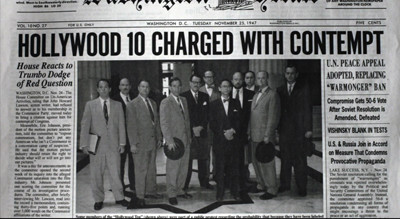News
Marketer Magazine: On The Record: Conducting Strong Interviews with the Media
A Black Mark for America: The Hollywood Blacklist
In the years following World War II, Americans became increasingly wary about communism infiltrating society with socialist ideals. This worry was spurred on by international events such as the Soviet Union testing its first atomic bomb and the descent of the Bamboo Curtain as China became a communist nation. Out of this frenetic environment of fear and paranoia, the House Un-American Activities Committee emerged. The goal of the HUAC was to investigate any alleged subversive and disloyal activities of ordinary U.S. citizens. Of all the committee’s investigations, the most notable revolved around the blacklisting of writers, directors and actors in Hollywood.

One of the biggest fears during the Red Scare was that communists would infect the American psyche by creating films that depicted communism in a favorable light. Films are considered one of the best ways to spread propaganda — they reach a wide audience and are able to depict a new reality that can normalize the propaganda message in the mind of the viewer.
By 1947, The House Un-American Activities Committee (an ironic name, considering its tactics) rounded up supposed communists in Hollywood and questioned them in court. Whether they were active members of the communist party or simply victims of the witch hunt, the only way to save themselves from the career-ending blacklist was to give up names of “communist sympathizers” in Hollywood.
Ten of the subpoenaed writers and directors came together to protest the violation of their rights. These uncooperative witnesses became known as the Hollywood Ten, and their refusal to cooperate led to citations for contempt of Congress. The charges of contempt made it clear to everyone that their First and Fifth Amendment rights held no weight in this rabid search for communist influencers. Each man was sentenced to one year in prison and fined $1,000, inflicting irrevocable damage to his career. The Bill of Rights held no sway and neither did fame — some of the most famous writers, directors and actors of the time were blacklisted, including Charlie Chaplin, Orson Welles, Dalton Trumbo, Langston Hughes, Arthur Miller and Dorothy Parker.
The blacklist came to an end in the late 1950s, in part due to shifting public opinion. One of the catalysts for this shift was a series of media missteps by Sen. Joseph McCarthy, best known for “McCarthyism” and the fear-mongering tactics he used to stir unrest. After years of successfully fueling the Red Scare, McCarthy made the mistake of interrogating decorated military heroes during televised hearings. This visual medium captured the mean-spirited nature of McCarthy’s attack in a way that printed news couldn’t. It changed the minds of many of his supporters, proving that not all press is good press. During the hearing, U.S. Army Special Counsel Joseph Welch responded to a particularly cruel and baseless accusation from McCarthy with the question, “Have you no sense of decency?” This simple question shamed McCarthy and all those who followed him, helping to put an end to the Hollywood blacklist.
